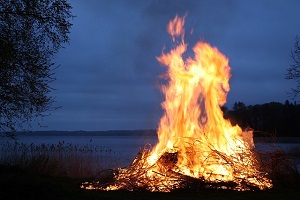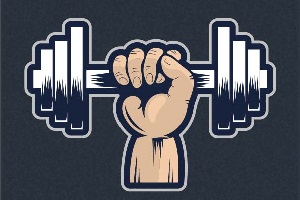Ding (丁) is the second of the two fire characters and is the fourth of the ten heavenly stems.
It can be translated to mean nail, population, and a descriptive term to describe something that is small in size.
The elemental nature of Ding is yin fire (陰火).
While Bing fire is an icon of intense fire with big strong flames, Ding fire should be thought of as small soft fire that is under a high degree of control.
This can be pictorially represented by gentle candle flames or smouldering charcoal that can be easily put out.
They can provide warmth to those who seek it, but can still burn when you get too close.

Being a fire-centric character, it is associated with the red phoenix among the 4 celestial creatures.
The middle period of summer season is sometimes referred to as the Ding period of June and July.
Like Bing, the Ding character is also finds affinity with the Li trigram.
With reference to the 24 mountains, Ding takes up the sector of 187.5° – 202.5° at a southern direction.
Regarding reference to body parts, Ding can point to parts such as the heart and oral areas.
In terms of numerology, the number 2 is what Ding Fire identifies with.
It is also found as a hidden stem in the branches Wu (E7), Wei (E8) and Xu (E11). It has a combination relationship with Ren (H9) to produce wood, and clashes with Xin (H8) and Gui (H10).
Ding fire self element
People with ding fire as the day master are often warm, inspirational, passionate, creative and kind.
They can often illuminate the lives of others by just being themselves.
This can make them a magnet of both good and bad company.
Which way they move towards in life will therefore be down to their life decisions.
They make great leaders as they are passionate and very capable of controlling that fire in their belly towards a direction they wish to move towards in life.
This also makes them great motivators.
Saying that, people who appear to be quiet, reserved, and introvert are often those with Ding fire day masters. Just take note that this perception and impression. Whether they truly are is a matter altogether.
They are also often elegant in poise, refined in behavior, and exhibit gracious mannerism when interacting with others.
A selfless ability to sympathize and empathize makes them the type of friends everybody loves to have in social groups.
Great things await them in life. But not many are able to realize that potential in them.
It can sometimes take only a small change for a Ding personality to create a huge impact in life that takes a person onto a whole new level.
This can be an event that occurs in life.
The problem is that finding that small change poses the greatest challenge for Ding individuals.
Some can go on a life pursuit to achieve an objective. But they would only realize that that objective would only be a catalyst for something far greater that they imagined once they get there.
Another drawback is that Ding self-elements are often proud and sometimes make the wrong decisions even though they know it would be a mistake.
But solving mistakes can be an easier pill to swallow compared to admitting that they are wrong in the first place.
While most Ding fire personalities are willing learners to improve themselves, they can also be more sensitive to what others think compared to other people.
This is a trait that can cut both ways. One can be driven by compliments or depressed by criticism.
A helpful nature also makes them a source of advice at work. But an eagerness to provide assistance to others can cause them to stray from their own responsibilities.
The relation of the elements to Ding Fire is as follows:
- Wood – Resources
- Fire – People
- Earth – Intelligence
- Metal – Wealth
- Water – Status
They can be delved deeper for more details by erecting the 10 gods of bazi.
10 Gods
| Stem | God |
| Jia | Direct Resource |
| Yi | Indirect Resource |
| Bing | Competitor |
| Ding | Friend |
| Wu | Extrovert Talent |
| Ji | Introvert Talent |
| Geng | Direct Wealth |
| Xin | Indirect Wealth |
| Ren | Given Authority |
| Gui | Earned Authority |
More about the 10 gods is discussed here.
Ding fire in relation to other self-element heavenly stems
| Self Element | Ding Fire |
| Jia | Extrovert Talent |
| Yi | Introvert Talent |
| Bing | Competitor |
| Ding | Friend |
| Wu | Direct Resource |
| Ji | Indirect Resource |
| Geng | Given Authority |
| Xin | Earned Authority |
| Ren | Direct Wealth |
| Gui | Indirect Wealth |















